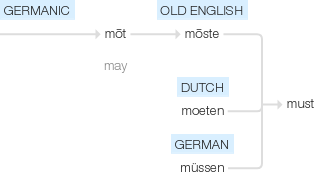Must
Old English mōste, past tense of mōt ‘may’, of Germanic origin; related to Dutch moeten and German müssen .
wiktionary
From Middle English moste("must", literally, "had to", the past tense of Middle English moten(“to have to”)), from Old English mōste(“had to”), 1st & 3rd person singular past tense of mōtan(“to be allowed, be able to, have the opportunity to, be compelled to, must, may”). From Proto-Germanic *mōtaną. Cognate with Dutch moest(“had to”), German musste(“had to”), Swedish måste(“must, have to, be obliged to”). More at mote.
From Middle English must, from Old English must and Old French must, most, both from Latin mustum.
From Persian مست (mast, “drunk, inebriated”), from Middle Persian 𐭬𐭮𐭲 (mast).
etymonline
must (v.)
auxiliary of prediction, "be obliged, be necessarily impelled," from Old English moste, past tense of motan "have to, be able to," from Proto-Germanic *motanan (source also of Old Saxon motan "to be obliged to, have to," Old Frisian mota, Middle Low German moten, Dutch moeten, German müssen "to be obliged to," Gothic gamotan "to have room to, to be able to"), perhaps from PIE root *med- "take appropriate measures," but this old suggestion lately has been doubted. Used as present tense from c. 1300, eventually displacing motan, from the custom of using past subjunctive as a moderate or polite form of the present.
must (n.1)
"new wine," Old English must, from Latin mustum (also source of Old High German, German most, Old French moust, Modern French moût, Spanish, Italian mosto), short for vinum mustum "fresh wine," neuter of mustus "fresh, new, newborn," perhaps literally "wet," and from PIE *mus-to-, from root *meus- "damp" (see moss).
must (n.2)
"mold, moldiness," c. 1600, perhaps a back-formation of musty (q.v.).
must (n.3)
"male elephant frenzy," 1878, from earlier adjective (1855), from Urdu mast "intoxicated, in rut," from Persian mast, literally "intoxicated," related to Sanskrit matta- "drunk, intoxicated," past participle of madati "boils, bubbles, gets drunk," from PIE root *mad- "wet, moist" (see mast (n.2)).
must (n.4)
"that which has to be done, seen, or experienced," 1892, from must (v.). As an adjective, "obligatory, indispensable," by 1912, from the noun; must-read (n.) is from 1959.
